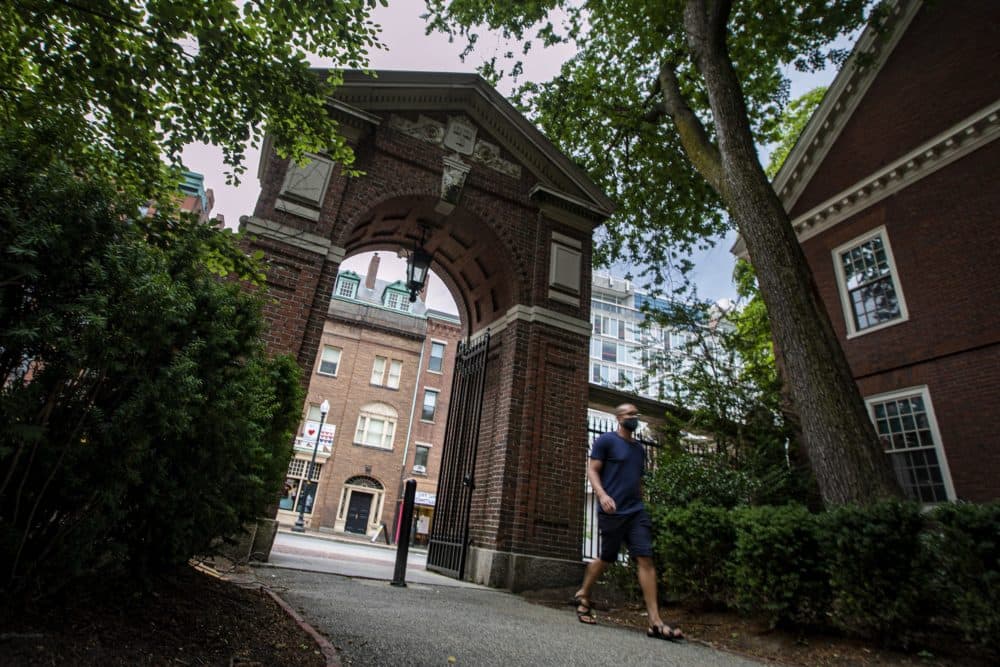Advertisement
Gov't Rescinds Rule Barring Foreign Students From U.S. While Colleges Hold Classes Remotely

The Department of Homeland Security agreed to rescind new and tighter restrictions placed on student visas amid a suit begun by Harvard and MIT.
The striking reversal came Tuesday afternoon, in a hearing in federal court in Boston that lasted just a few minutes.
Judge Allison Burroughs announced that the government had agreed to strike the July 6 rule as put forward by Immigration and Customs Enforcement (ICE), which aimed to block international students from living in the U.S. if they planned to take their courses entirely online.
That means colleges nationwide will return to the more lenient regime established in March, which allows international students to take classes fully online. Hundreds of colleges had joined MIT and Harvard in the elite schools’ suit against the government.
Attorneys for the Department of Homeland Security had attempted a robust defense of the policy change in a filing Monday.
They observed that F-1 and M-1 visas — those subject to restriction — have historically barred recipients from taking more than one course online. They also emphasized that ICE’s springtime decision to waive that requirement was presented as “subject to change.”
Attorneys for Harvard and MIT replied aggressively Tuesday morning. They argued that the government had not provided “any reasoned basis” for the new and tougher rule, and appear motivated “by a different agenda altogether… [i.e.,] the government’s stated desire to encourage universities to reopen,” as expressed by President Trump at a meeting last week.
In that way, the universities alleged, the Department of Homeland Security had again run afoul of the Administrative Procedure Act with an “arbitrary and capricious” policy change — just weeks after the Supreme Court turned back DHS’ attempt to end the DACA program on the same grounds.
International students had already begun to feel the sting of the new rule — especially those at Harvard, one of relatively few institutions that plans to offer no in-person teaching this fall.
Advertisement
Before ICE issued its new rule on July 6, Lavinia Teodorescu — a Harvard junior from Romania — had planned to return to Cambridge this fall. But between the Trump administration’s policy shift last week and existing travel restrictions in Europe, she found herself all but stuck at a friend’s home in the United Kingdom.
Ahead of Tuesday’s hearing, Teodorescu described a panic experienced by many of her peers: “People can’t go home, and they can’t go to campus, apparently. They’re saying to transfer to another college. It’s almost impossible to transfer, midway through July!”
Meanwhile, attorneys for Harvard and MIT published anonymous affidavits from students. Last week, one Harvard sophomore was blocked from entering the United States at an airport in his native Belarus. U.S. diplomatic officials told him that he was excluded due to the new visa rule.
After the hearing, the relief was widespread. “Common sense has prevailed,” said Simge Topaloğlu, a doctoral candidate in psychology at Harvard who was born in Turkey.
Topaloğlu spent the last week facing the abandonment of both her research and her lease. She had called in to listen to Tuesday’s remote hearing, and was surprised by how quickly the government lawyers backed down.
“The defendants rescinded the policy directive without a fight,” Topaloğlu said, “presumably in the knowledge that their arguments did not hold water and the directive was legally indefensible.”
Among administrators, too, the mood was relief. In an email to the MIT community, L. Rafael Reif, the institute's president, said he was "pleased" by the government's hasty retreat. "These students make us stronger," wrote Reif, himself a former international student, "and we hurt ourselves when we alienate them."
But the alienation is real. Aparna Gopalan, a fourth-year doctoral student in anthropology at Harvard, said the new rule left her with only impossible options: drop out of a program and relinquish all her funding and research, or return to her native India, still largely closed to international travel.
"It's been the way I imagine being in this country must be like for people who are undocumented," Gopalan said, of a week of uncertainty and panic. Though they're now safe again, international students "got a taste of that now, for the first time."
Gopalan said she hopes there will be no further restrictions on international students for the duration of the pandemic. "I would hope that, instead of obsessing over the border, people in [U.S.] government start focusing on testing and tracing," Gopalan said — then adding that she considers this to be a "pipe dream."
Lawyers from across the United States had swarmed behind Harvard and MIT as they challenged the policy. As of Tuesday morning, the docket showed over a dozen amicus briefs filed in the case’s weeklong history.
Among the ‘friends of the court’ to join Harvard and MIT in defense of international students were the cities of Boston and Los Angeles, scientific organizations, and hundreds of universities, including Northeastern, Stanford and Yale.
Massachusetts Attorney General Maura Healey had initiated her own suit, and cheered Tuesday's news on Twitter:
At the end of the brief hearing, Judge Burroughs congratulated both legal teams for coming to a prompt and professional agreement to strike the rule, thereby staving off a prolonged legal battle. “You’ve both done your respective clients proud,” Burroughs said.
This is not the judge’s first major case involving Harvard. Last fall, Burroughs found in favor of Harvard after a sustained challenge to its policy of race-conscious admissions. (The plaintiffs, led by conservative legal activist Edward Blum, immediately appealed that decision.)
This article was originally published on July 14, 2020.
This segment aired on July 14, 2020.

